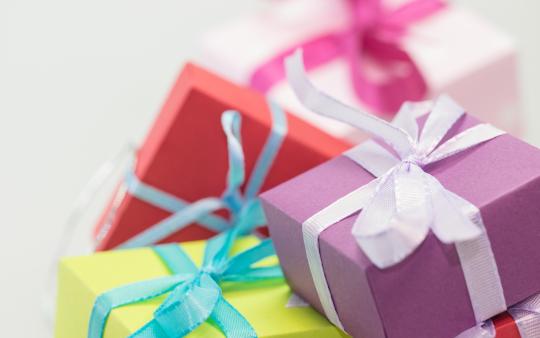For some of us, making our kids believe that resources are not infinite, that the world is fragile, that we are in charge of it, and that our health can actually be affected by our decisions, is akin to explaining that Santa Claus isn’t real. While this is understandable, it is essential that we perpetually teach our kids how to be conscious consumers and practice mindful gift giving with grand conviction and consistency. In the end, understanding that giving is better than receiving, along with how to gift well, is one of the best lessons we can learn together as a family, and as a community at large.
When we all give GOOD gifts to each other, we are creating a more sustainable lifestyle – when we teach and inspire our kids to give consciously, they naturally pass those habits on to their friends, family members and eventually, future generations. So, the bonus with every greener, healthier gift we give is the gift of sharing strong values. And, if we can all gift our children with the ability and desire to think for themselves, and to always give big, imagine what the world will be like.
As parents, our extra effort, and often tough-to-explain (and enforce) rules, can result in a more conscious kid who doesn’t need extravagant gifts to feel loved. Being tough and having lots of rules is particularly challenging in our society; we often bear criticism from others for “making life difficult,” or “not being appreciative” of gifts given to us that don’t fit with our values. No one said it was easy, but it certainly is worth it. My son Ryan and I put our heads together in hopes that some of our tips and suggestions would be helpful as we all embark on our gift giving – and receiving – missions this season.
Gifts happen
Lisa: Ryan and I don't need any more stuff. You probably don't either. What could you possibly be hoping to receive that's of greater value than a healthy environment – your immediate one, and our shared world? Shiny (toxic) toys, over-packaged gift baskets and more fast fashion pales in comparison to the value of a healthy you, healthy home, and healthy world. When we buy lots of “stuff” it has an effect – on all of us. So try to give the most thoughtful gift this holiday season by first considering gifts that aren’t store-bought!
Ryan: I sort of agree. Mostly. But, I do like some things that are store bought, especially electronics. I know they are all made with toxic chemicals, and that too much of it ends up in landfill right away, but sometimes I really wish I could just get a new iPod or computer without feeling bad about it. I guess our solution is just not upgrading as soon as a something new is available. So, if you are buying a gadget for someone else, make sure they really need it and will use it. I got my iPod years and years ago, and listen to music every day walking to school, so to me, it’s still a healthy gift.
Lead by example
Lisa: Shop with your kids, and take the time to explain why you are buying someone the gift you are. Showing them at every possible opportunity how you make decisions and how you stand behind the choices you make, and expressing your reasons for making these choices will help them understand why you chose the way you did. Then, they may not make the same choices that you do, but even better, they will make their own conscious choices.
Ryan: My mom doesn’t just say “no,” she always explains why she is saying “no,” and it is usually a good and valid reason, even if I’m a bit disappointed that my idea won’t work. When it makes perfect sense, it’s a lot easier to accept than when it’s just a plain old “no” without an explanation.
Buy gifts from local artisans
Lisa: Or at the very least a local business that takes pride in curating useful, well-made products. Think about where the product was made, how its materials affect our air, water, soil and the people who made it, how it will be used and for how long, and where it goes when you are done with it. Getting connected to the item will result in you making a great decision, every time!
Ryan: I have really learned that where things are made matters. I’ve learned that “made in China” stuff is generally made in large toxic factories that pollute our world and don’t treat the people that work there well. Sometimes we play a game, checking to see if we can find things that aren’t made in China, and when we do, we look at it closer to see what it’s made from and if it’s a good product. I used to get frustrated when things I wanted to buy were all from China, but now I just get excited when I find something that does fit my values. I have learned that every dollar I spend is a vote for the company, telling them, “Make more of this, I like it.” So, if you think about all this, you will probably buy really good stuff.
Give something that you’ve made
Lisa: I always encourage my kids to make a card themselves, often reusing pieces of paper, even if it goes along with a purchased gift. It’s not always a frame-worthy work of art, but the kids take the time to do it themselves, which means they take more pride in giving it. Plus, it beats giving a store bought card with a generic greeting inside.
Ryan: I really like making gifts, and people appreciate it, too. Sit down at your desk, get some materials out and let your creative mind take over. Write a song, change the lyrics to a song you love and record it, create a playlist, write a poem and frame it. I like writing and music, but you can use whatever your talent allows you to create. One year, we made a really good caramel popcorn for my teachers and packaged it in reusable snack containers; that was a mix of handmade and store-bought, and everyone loved it.
Buy gifts they will really enjoy and use
Ryan: Sometimes I get excited when I see something that looks interesting, and I think I want to buy it, but after my impulse subsides, I think about how often my friend is going to use it, if they will have the time to use it, and if it’s not just a fad that will be used only for a short time. Then, mostly I end up realizing that it’s not a great gift, and I’m not even disappointed walking away from getting it. My parents taught me to not get a gift for someone without putting the thought into it. Sometimes I get stumped, but we always figure something good out.
Skip the wasteful wrap and ribbons
Lisa: No matter how pretty you find them, refuse the “free” wrapping at the store – everything costs us something! The last time I checked, wrapping gifts was not on people's “fun things to do” list. (We, personally, use unwrapped gifts as an opportunity to be both lazy and eco-responsible…See how it all works out?). Or try some fun and creative ways to wrap!
Ryan: We like using reusable shopping or produce bags to wrap things, so I can do that myself, and sometimes we just use artwork from school that we aren’t keeping – it makes the best wrapping paper.
Experiences are our favourite to receive
Lisa: (and if you are a really good friend, you can tag along, too!). Your gift doesn’t need to be complicated or expensive to be appreciated. It's also a great way to support the businesses you already appreciate.
Ryan: It’s so exciting to get concert or theatre tickets, a day trip somewhere, or a really good dinner out (that’s one of my favourites!).
Share your favourite healthy things
Lisa: Sometimes it’s okay to give people what you think they need more of in their life, not necessarily something they know they want.
Ryan: If you give organic food or drink as gifts, that should make everyone happy and can be just as good as anything. Just make sure of any allergies and dietary needs of the person you are giving to, because you’ll feel worse than the person receiving it, if they can’t eat it.
Teach your kids to say “Thank you”
Lisa: Even when the gift runs counter to your values. After all, you are not thanking the person just for the gift, but for the effort and resources that they spent to give it to you. I find this the most challenging, as honesty is important, but there are ways to handle unwanted gifts while still showing appreciation.
Ryan: When someone gives me a gift, I have learned to always say thank you, no matter what it is, because the person giving it to me was still doing something nice for me. We do return or exchange things sometimes, or even donate them. It’s always embarrassing when my little brother tells people loudly that there are chemicals in the gift so he won’t use it. I wish he would wait until after, when they’re not around!
The “new” gift giving can inspire people to live healthier lives, make the world a better place, support good people and companies, doesn't create excess waste, and, of course, makes your receivers really, truly, very happy!
*Originally published November 16, 2013






